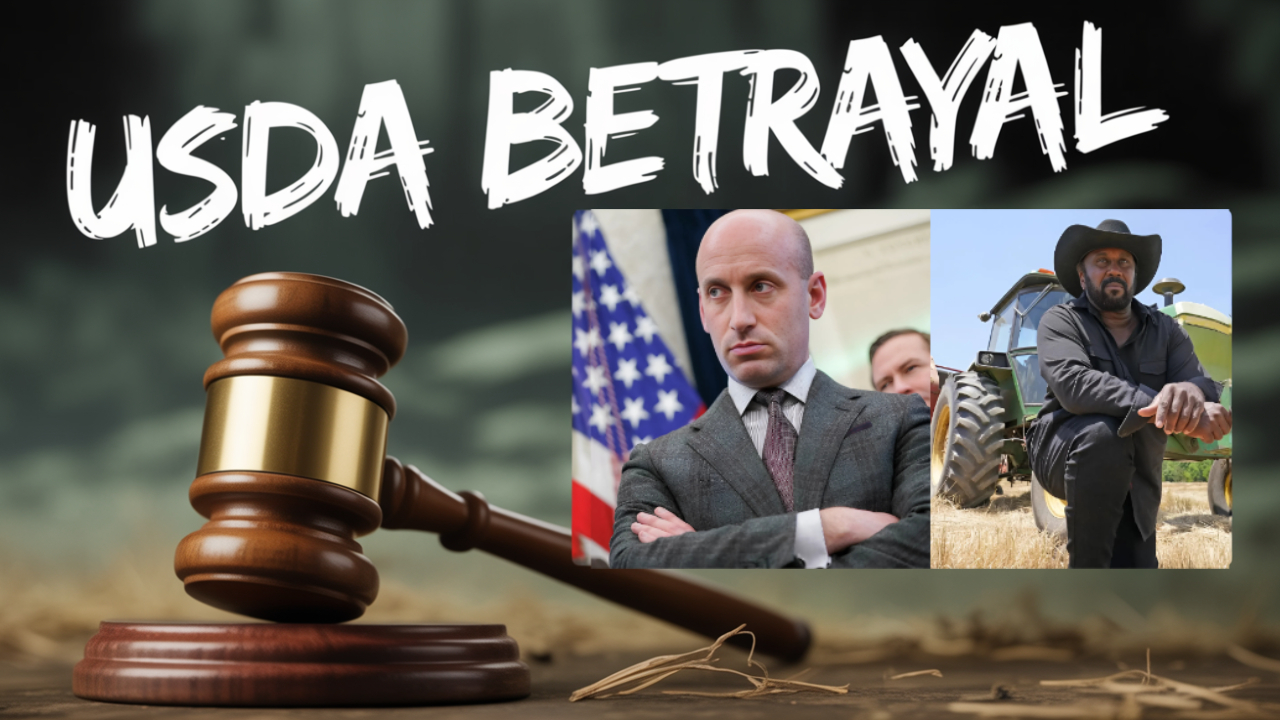For generations, Black farmers in America have fought an uphill battle—not only against the land but also against a system that was never designed with them in mind. That fight seemed to turn a corner in 2021, when the USDA offered targeted debt relief under the American Rescue Plan. But that hope was short-lived—cut down by a legal assault led by Stephen Miller, now White House Deputy Chief of Staff for Policy and United States Homeland Security Advisor, who at the time was heading the conservative legal group America First Legal.
A Century of Broken Promises
At their peak in 1920, there were nearly one million Black farmers in the U.S. Today, that number has dropped below 50,000, accounting for less than 1.5% of all U.S. farmers and owning under 0.5% of farmland.
This steep decline wasn’t due to disinterest or poor business skills—it was driven by institutional discrimination, especially from the USDA. Delayed loans, outright denials, and unequal access to grants devastated Black agricultural wealth over the 20th century.
In 1999, the Pigford v. Glickman lawsuit officially acknowledged USDA discrimination, awarding close to $1 billion to affected farmers. But tens of thousands of claims were rejected, and meaningful redress remained elusive.
"You can’t talk about farming in this country without talking about racism," said John Boyd Jr., president of the National Black Farmers Association. "The government took land and opportunity from us—and never gave it back."
2021: A Promise Made, Then Paused
The American Rescue Plan Act of 2021 included $4 billion in debt forgiveness for 'socially disadvantaged farmers'—a classification that included Black, Latino, Native American, and Asian American farmers. It was the most explicit federal effort in decades to rectify past injustices.
But the program was short-lived.
Just months after the bill passed, a series of lawsuits were filed by white farmers and conservative-aligned legal groups across multiple states, arguing that providing aid based on race violated constitutional equal protection rights. Among the most prominent was the suit led by Stephen Miller’s America First Legal, which quickly became the face of the legal opposition.
"The government cannot distribute benefits and burdens based on skin color," Miller said at the time. "It’s un-American and unlawful."
It is absolutely unlawful and un-American for our government—through the USDA—to discriminate against any farmer. However, this program was not about discrimination—it was about redress. It was an attempt to correct a century of inequity, not to create new ones.
These lawsuits were part of a broader conservative legal strategy aimed at dismantling race-conscious policies across multiple sectors—including education, health care, and agriculture. But it was Miller’s organization that gained national attention and successfully secured a nationwide injunction in June 2021. As a result, the USDA program was frozen indefinitely—leaving thousands of minority farmers without promised relief.
What Changed—and What Didn’t
In response to the legal setbacks, Congress passed the Inflation Reduction Act of 2022, which redirected the relief money. Instead of race-specific aid, it created:
- $2.2 billion for farmers who could prove discrimination (regardless of race)
- $3.1 billion for economically distressed borrowers of any race
But many Black farmers say the new system is harder to access and lacks the urgency the original plan promised.
"We’ve been pushed to the back of the line again," said Tracy Lloyd, a Georgia farmer whose family has worked the land since the 1930s. "They’re telling us justice has to wait. Again."
2025: USDA Retreats from Race-Based Equity
In a quiet but consequential move, the USDA announced in July 2025 that it would eliminate race and sex from eligibility considerations in many farm programs. Critics say this is a direct result of legal and political pressure—and a retreat from accountability.
"This move guts the one avenue where USDA programs were finally starting to work for farmers of color," said Margo Schlanger, a law professor at the University of Michigan.
The Human Cost
These legal decisions aren’t theoretical—they’re economic death sentences for many Black farmers who were counting on relief to keep their farms afloat.
During the COVID-19 pandemic, of the $26 billion in emergency USDA aid distributed nationwide, less than 0.1% went to Black farmers. Without targeted intervention, that gap only widens.
"We didn’t get help then, and now they’re saying we don’t qualify for help now either," said Fred Carter, a North Carolina farmer. "What are we supposed to do—watch our land get auctioned off?"
Where Do We Go From Here?
While Stephen Miller's lawsuit may have succeeded in reshaping the government's approach, it also reignited the fight for agricultural justice. Advocates are now calling for:
- A reinstatement of targeted aid programs
- An overhaul of USDA’s local lending systems
- Legal reforms to protect restitution for historically wronged communities
The courts may have the final say—but public pressure is growing.
"We’re not asking for special treatment," said Boyd. "We’re asking for a fair shot—something we’ve never truly had."
Final Thought
The lawsuit may have been filed in 2021, but its impact still echoes across America’s fields in 2025. If this country truly wants to heal its agricultural wounds, we must stop retreating from hard truths.
It used to be said that knowing history helps us shape a better future—ensuring we don’t repeat the same mistakes. But this story makes something else equally clear: history doesn’t just inform the future—it dictates who deserves equity and compensation today. Erase that history, and you erase the basis for redress. You erase the rationale for specific criteria that aim to level a system tilted for generations.
If we abandon the context of injustice, we also abandon those who suffered it.







